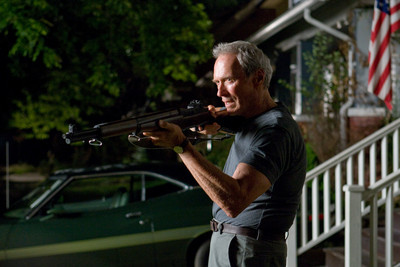‘Gran Torino’
If the prospect of Clint the Squint growling "Get off my lawn!" while staring down a rifle barrel at some scummy young punks makes your day, then "Gran Torino" will get your motor running.
For some of us, however, this vigilante melodrama stalls and backfires at least as often as it shifts into high gear.
More's the pity, because Clint Eastwood the actor -- in what he has stated is his final movie-star bow -- has a blast creating a character who's a curmudgeonly combination of Dirty Harry and Ebenezer Scrooge.
If only "Gran Torino" were as solidly built as its title vehicle: a 1972 Ford Grand Torino that's as much of a relic as its owner, Walt Kowalski (Eastwood).
But there's a difference between the vintage vehicle and its disgruntled owner -- everybody wants the car.
Nobody wants Walt, a recently widowed Korean War vet with unhealed psychological wounds, who spent his postwar years building Fords (including his Gran Torino) at a Detroit auto plant.
Now he's retired, estranged from his upwardly mobile sons -- and the last Angry White Guy in an embattled neighborhood that's home to a disconcerting (at least to Walt) array of ethnic minorities. (Somebody should explain that he's the minority now.)
An equal-opportunity bigot, Walt's hostility extends from his family to almost everyone who crosses his path -- or, more to the point, his lawn.
But a funny thing happens when Thao (achingly earnest Bee Vang), the fatherless Hmong teen next door, tries to steal Walt's prized Gran Torino as part of a gang initiation.
Despite his withering opinion of his immigrant neighbors, Walt finds himself drawn into their orbit -- and emerging as a reluctant hero when he trains his trusty M-1 rifle on miscreants disturbing the peace.
No prizes if you guess that Walt will become a role model for young Thao -- and Thao's defender in an ongoing war with his local gangstas hassling Thao and his older sister (the saucy Ahney Her) as well.
"I finish things," Walt rasps in response to a question about his intentions. "It's what I do."
And that's exactly what audiences would expect an Eastwood character to say.
Almost everything in "Gran Torino" unfolds exactly as expected -- and the movie's much the worse for it.
Initially, screenwriter Nick Schenk (working from a story he wrote with fellow neophyte Dave Johannson) sets up "Gran Torino" as a potentially intriguing character study -- of a character who's not exactly the most sympathetic son-of-a-gun around.
Eastwood, of course, is a past master at playing these sorts of irascible loners, whether "Dirty Harry's" title cop or "Million Dollar Baby's" crotchety boxing coach.
As a result, while watching "Gran Torino," we're not really reacting to Walt Kowalski, we're reacting to Eastwood himself: a legendary, iconic figure as familiar and comfortable as a favorite pair of old shoes.
That switch undercuts the movie's dramatic impact -- but not as much as the script's broad, obvious setups and sledgehammer payoffs.
"Gran Torino" skids and swerves from hand-wringing, heart-tugging melodrama to cornball culture-clash comedy that might seem mildly amusing if it weren't so painfully strained. (I kept waiting for Clyde the orangutan from "Every Which Way But Loose" to make a cameo appearance; he might have classed up the joint.)
Eastwood's self-indulgent performance echoes "Gran Torino's" all-over-the-place qualities.
Occasionally, he strikes wrenching emotional chords, as when Walt finally reveals why he remains haunted by his wartime experiences.
More often than not, however, he growls and glowers with old-coot glee, spitting out racial epithets and mad-as-hell threats while channeling the ghosts of Eastwood past.
Eastwood may have mixed emotions about the violent icon millions have idolized for decades. ("Unforgiven" remains his ultimate comment on that subject.)
But in "Gran Torino," there's little room for mixed emotions -- or the sort of soul-searching that would make it more than an underpowered star vehicle masquerading as an all-time classic.
Contact movie critic Carol Cling at ccling@reviewjournal.com or 702-383-0272.
Carol Cling's Movie Minute Review “Gran Torino” 116 minutes R; pervasive profanity and racial epithets, violence Grade: C+ at multiple locations DEJA VIEW From cowboy to cop, from country singer to astronaut, Clint Eastwood has directed himself in a wide variety of roles. A few of his greatest hits: “Bronco Billy” (1980) — A former shoe salesman (Eastwood) leads a ragtag Wild West troupe trying to keep the spirit of the frontier alive in 20th-century America. “White Hunter, Black Heart” (1990) — On location in Africa, a renowned filmmaker (Eastwood) becomes obsessed with killing an elephant in this drama based on the making of John Huston’s “The African Queen.” “Unforgiven” (1992) — Eastwood won the first of two best director Oscars for this gritty Western, playing an ex-gunslinger who agrees to one last hired killing, putting him on a collision course with a corrupt sheriff (Oscar-winner Gene Hackman). “The Bridges of Madison County” (1995) — In 1960s Iowa, a farm wife (Meryl Streep) finds fleeting, bittersweet romance with a wandering National Geographic photographer (Eastwood). “Million Dollar Baby” (2004) — In this multiple Oscar-winner, a crusty trainer (Eastwood) and his longtime friend (Morgan Freeman) guide a wannabe boxer (Hilary Swank) to success.— By CAROL CLING















